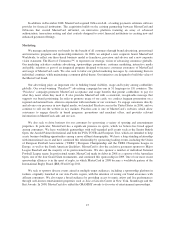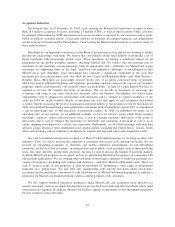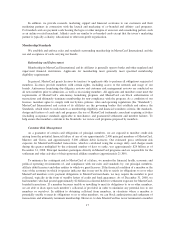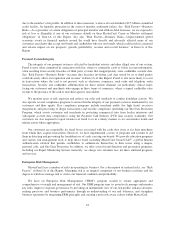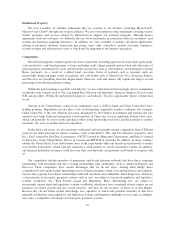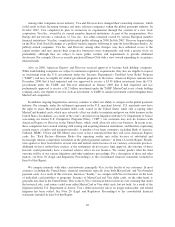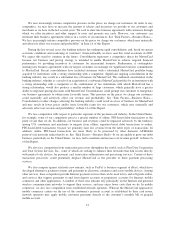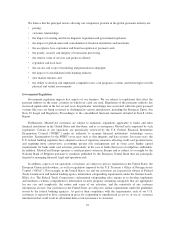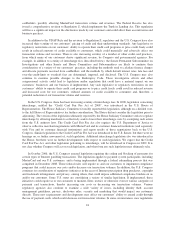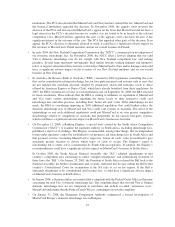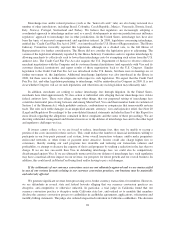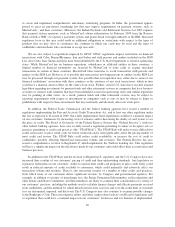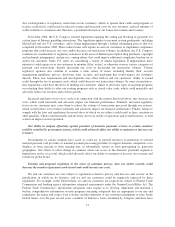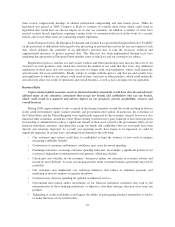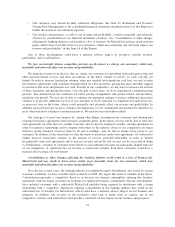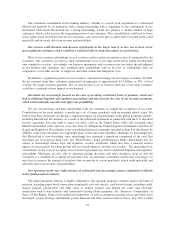MasterCard 2008 Annual Report Download - page 35
Download and view the complete annual report
Please find page 35 of the 2008 MasterCard annual report below. You can navigate through the pages in the report by either clicking on the pages listed below, or by using the keyword search tool below to find specific information within the annual report.could have the effect of limiting our customers’ ability to offer new types of payment programs or restricting
their ability to offer our existing programs such as stored value cards, which could materially and adversely
reduce our revenue and revenue growth.
Outside of the United States, regulators in several other countries have become increasingly interested in
payment industry issues, some of which have launched official proceedings into payment industry issues. See Note
20 (Legal and Regulatory Proceedings) to the consolidated financial statements included in Item 8 of this Report.
Seasonality
See “Management’s Discussion and Analysis of Financial Condition and Results of Operations—
Seasonality” in Item 7 of this Report for a discussion of the impact of seasonality on our business.
Financial Information About Geographic Areas
See Note 23 (Segment Reporting) to the consolidated financial statements included in this Report for certain
geographic financial information.
Employees
As of December 31, 2008, we employed approximately 5,500 persons, of which approximately 1,850 were
employed outside of the United States. We consider our relationship with employees to be good.
Website and SEC Reports
The Company’s internet address is www.mastercard.com. Our annual report on Form 10-K, quarterly
reports on Form 10-Q, current reports on Form 8-K and amendments to those reports are available, without
charge, for review on our website as soon as reasonably practicable after they are filed with, or furnished to, the
U.S. Securities and Exchange Commission (the “SEC”). The information contained on our website is not
incorporated by reference into this Report.
Item 1A. Risk Factors
Legal and Regulatory Risks
Interchange fees are subject to increasingly intense legal and regulatory scrutiny worldwide, which may
have a material adverse impact on our revenue, our prospects for future growth and our overall business, and
thus on our revenue.
Interchange fees, which represent a sharing of payment system costs among the financial institutions
participating in a four-party payment card system such as ours, are generally the largest component of the costs
that acquirers charge merchants in connection with the acceptance of payment cards. Typically, interchange fees
are paid by the merchant bank (the acquirer) to the cardholder bank (the issuer) in connection with transactions
initiated with our payment system’s cards. Interchange fees, including our default interchange fees, are subject to
increasingly intense litigation and regulatory scrutiny worldwide as card-based forms of payment have become
relatively more important to local economies. Merchants in the U.S. and New Zealand, and regulators in a
number of countries are seeking to reduce these fees through litigation or regulatory action. For example:
• In the European Union, the European Commission announced a decision in December 2007 with respect
to our cross-border interchange fees for credit and debit cards under European Union competition rules.
The decision required MasterCard to cease applying its default cross-border interchange fees for
MasterCard and Maestro branded consumer payment card transactions in the European Economic Area
(the “EEA”), to refrain from repeating the infringement, and not to apply its then recently adopted
25


